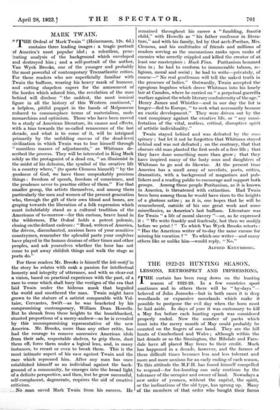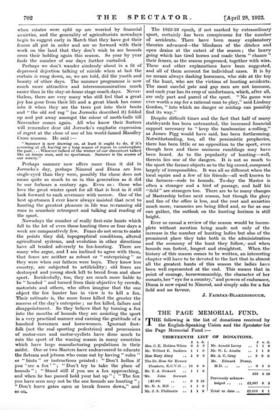THE 1922-23 HUNTING SEASON. LESSONS, RETROSPECT AND IMPRESSIONS. T HE curtain
has been rung down on the hunting season of 1922-28. In a few countries sport continues and in others there will be " by-days "- beloved of John Jorrocks—but in both cases it is deep woodlands or expansive moorlands which make it possible to postpone the evil day when the horn must be laid aside. In days of yore it was customary to kill a May fox before each hunting epoch was considered properly ended. Now the number of packs which hunt into the merry month of May could probably be counted on the fingers of one hand. They are the hill hunts of Cumberland and Wales ; although within the last decade or so the Sinnington, the Bilsdale and Farn- dale have all placed May foxes to their credit. Much has happened in a decade, however, and the farmer of these difficult times becomes less and less tolerant and more and more anxious for an early ending of each season. To this attitude the M.F.H. has found himself compelled to respond—for fox-hunting can only continue by the tolerance of the occupier and owner of land. Nowadays a new order of yeomen, without the capital, the spirit, or the inclinations of the old type, has sprung up. Many of the members of that order who bought their farms when estates were split up are worried by financial anxieties, and the generality of agriculturists nowadays begin to suggest early in March that they have got their fences all put in order and are so forward with their work on the land that they don't wish to see hounds cross their holding again this season. So year by year finds the number of our days further curtailed.
Perhaps we don't wander aimlessly about in a fit of depressed dejection talking of suicide when at last the curtain is rung down, as, we are told, did the youth and beauty of other days. The summer programme is now much more attractive and intercommunication much easier than in the stay-at-home stage coach days. Never- theless, there are very many who still feel that a great joy has gone from their life and a great blank has come into it when they see the trees put into their boots and " the old red rag " {as Jorrocks described it) folded up and put away amongst the odour of moth-balls till November comes again. All who know their Surtees will remember dear old Jorrocks's emphatic expression of regret at the close of one of his world-famed Handley Cross seasons. He said :- "Summer is now drawing on, at least it ought to do, if it's a-coming at all, leaving us a long season of repose to contemplate the past.... Whoever talked of the winter of our discontent talked like an insane man, and no sportsman. Summer is the season of our misery."
Perhaps summer now offers more than it did in Jorrocks's day, perhaps Nimrod and Diana are less single-eyed than they were, possibly the chase does not mean quite as much to us in this generation as it did to our forbears a century ago. Even so : those who love the great winter sport for all that is best in it still look forward to each severance with sorrow. One of the best sportsmen I ever knew always insisted that next to hunting the greatest pleasure in life was re-running old runs in armchair retrospect and talking and reading of the sport.
Nowadays the number of really first-rate hunts which fall to the lot of even those hunting three or four days a week are comparatively few. Foxes do not seem to make the points they did, topographical conditions, altered agricultural systems, and evolution in other directions have all tended adversely to fox-hunting. There are many who argue, and I am inclined to agree with them, that foxes are neither as robust or " enterprising " as they were when our fathers were boys, They know less country, are subjected to artificiality ; old foxes are destroyed and young stock left to breed from and show sport. Incidentally, too, they are much more liable to be " headed " and turned from their objective by crowds, motorists and others, who often imagine that the one object the fox hunter has in view is to kill a fox. Their estimate is, the more foxes killed the greater the success of the day's enterprise ; no fox killed, failure and disappointment. So they believe that by turning a fox into the mouths of hounds they are assisting the sport in a very practical manner and earning the gratitude of a hundred horsemen and horsewomen. Ignorant foot- folk (not the real sporting pedestrian) and processions of motor-cars and motor-cyclists have done much to ruin the sport of the waning season in many countries which have large manufacturing populations in their midst. One or two Masters have endeavoured to educate the flotsam and jetsam who come out by having " rules " or " hints " or instructions printed : " Don't holloa if you ' see a fox ' " ; " Don't try to take the place of hounds " ; " Stand still if you see a fox approaching, and when he has passed hold your hat up " ; " The fox you have seen may not be the one hounds are hunting " ; " Don't leave gates open or break fences down," and 60 on. The 1922-23 epoch, if not marked by extraordinary sport, certainly has been conspicuous for the number of accidents. There have been many- explanatory theories advanced—the blindness of the ditches and open drains at the outset of the season ; the heavy going which has tired horses and made them " chance ". their fences, as the season progressed, together with wire. These and other explanations have been suggested, and all of them account for individual cases. It is by no means always dashing horsemen, who ride at the top of the hunt, who are the victims of hunting accidents. The most careful gate and gap men are not immune, and each year has its crop of misfortunes, which, after all, are only part and parcel of the sport. " No game was ever worth a rap for a rational man to play," said Lindsay Gordon, " into which no danger or mishap can possibly find its way."
Despite difficult times and the fact that half of many stableyards has been untenanted, the increased financial support necessary to " keep the tambourine a-rolling," as James Pigg would have said, has been forthcoming. Notwithstanding, too, all the pessimistic prophecies, there has been little or no opposition to the sport, even though here and there ominous rumblings may have been heard. As to the popularity of hunting—well, therein lies one of the dangers. It is not so much to the sport the farmer objects as to the big crowd, composed largely of irresponsibles. It was all so different when the local squire and a few of his friends—all well known to the farmers—rode to hounds. To-day the Master is often a stranger and a bird of passage, and half his "field" are strangers too. There are to be many changes of Mastership before next season, but though the glory and fun of the office is less, and the cost and anxieties much more, vacancies are being filled and, so far as one can gather, the outlook on the hunting horizon is still bright.
Ever so casual a review of the season would be incom• plete without mention being made not only of the increase in the number of hunting ladies but also of the prominent place they take both in the administration and the economy of the hunt they follow,' and when hounds run fastest, longest and straightest. When the history of this season comes to be written, an interesting chapter will have to be devoted to the fact that in almost all the greatest hunts of this season the ladies have been well represented at the end. This means that in point of courage, horsewomanship, the character of her mounts, her "eye for a country," and powers of endurance, Diana is now equal to Nimrod, and simply asks for a fair field and no favour.
J. FAIRFAX-BLAKEBOROUGH.



















































 Previous page
Previous page